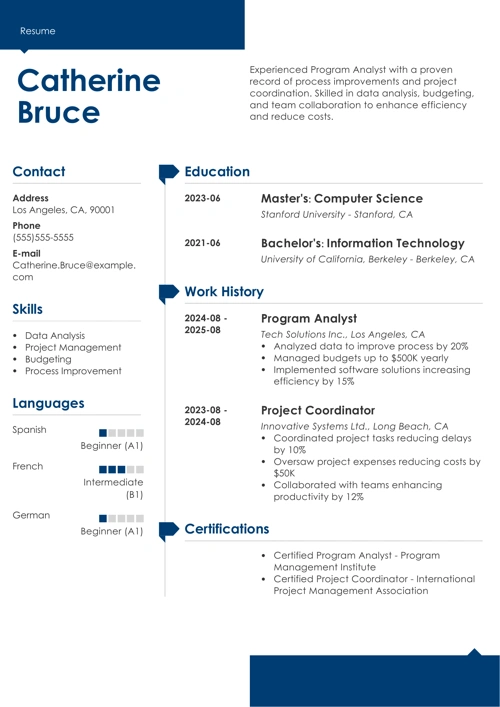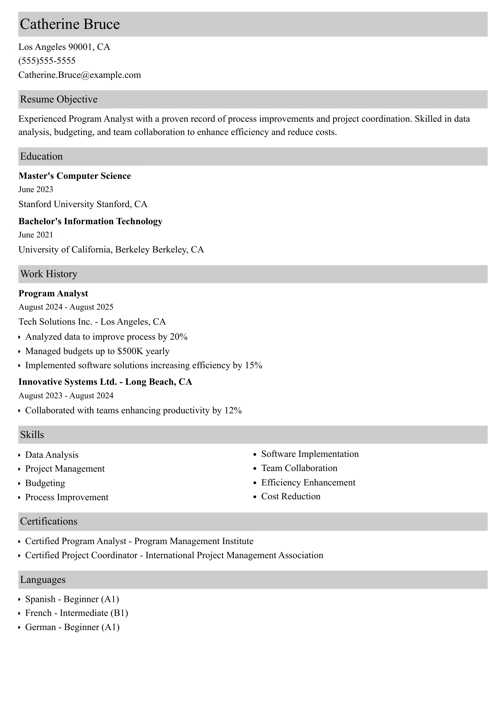Your job is finding inefficiencies and improving things. An expert in cost-benefit analysis like you shouldn’t have to struggle with finding a job. You should be getting paid a premium just to watch your colleagues work!
And you can. Those jobs exist. But they’re not open to those with suboptimal program analyst resumes. Let’s analyze your system functionality, then!
This guide will show you:
- A program analyst resume example better than 9 out of 10 other resumes.
- How to write a program analyst resume that will land you more interviews.
- Tips and examples of how to put skills and achievements on a program analyst resume.
- How to describe your experience on a resume for a program analyst to get any job you want.
Want to save time and have your resume ready in 5 minutes? Try our resume builder. It’s fast and easy to use. Plus, you’ll get ready-made content to add with one click. Explore our free resume templates and start building your resume today.
Sample resume made with our builder—See more resume examples here.
Need a different resume? We have dedicated guides for those, too:
- Analyst Resume Examples
- Business Analyst Resume Examples
- Data Analyst Resume Examples
- Business Intelligence (BI) Analyst Resume Examples
- System Analyst Resume Examples
- Data Scientist Resume Examples
- Market Research Resume Examples
- Data Engineer Resume Examples
- Programmer Resume Examples
- Business Intelligence BI Resume Examples
Program Analyst Resume Example
Catherine D. Bruce
Program Analyst
Cat.d.bruce@email.com
636-243-7444
Objective
Recent graduate with a degree in Business and a GPA of 3.9. Completed a data analyst internship at Stantec, earning 2 commendations from the manager and senior program analyst. Created 10+ detailed technical reports on client expansion plans. Eager to apply analytical and technical skills as a new junior program analyst at Cavan Solutions.
Experience
Data Analyst Intern
Stantec, Denver, CO
May 2022–November 2022
- Analyzed sales data using Excel and Tableau to identify key areas for improvement.
- Secured a top 5 provider of emergency management training with a 20% discount for a 3-week course after consulting my colleagues.
- Assisted in implementing a digital shift for the company’s efforts to move databases to a cloud-integrated solution, which involved data from 500+ projects with a combined worth of $7.5M.
- Collaborated with team members to create reports and dashboards for management.
Education
2020–2023 BS, Business
Leeds School of Business, University of Colorado, Boulder
GPA: 3.9/4.0
- Relevant coursework: Database Systems, Statistics for Data Science, Project Management, Business Analytics
- Honed presentation skills via the school’s Toastmasters Club.
- Graduated with honors.
- Won the Diverse Scholars program stipend for academic performance.
Skills
- Data analysis
- Adobe CC
- Power BI
- MS Office
- Presentation Skills
- Data visualization
- Problem-solving
- Learning from feedback
- Efficient team player & communicator
Projects
- Analyzed a dataset of customer reviews using Tableau to identify trends and provide insights for a family member’s company
Hobbies and Interests
- Black and white photography
- Yoga & hiking
Here’s how to write a job-winning program analyst resume:
1. Pick the Best Format for Your Program Analyst Resume
Program analysts assess, optimize, and enhance programs to develop more effective solutions for companies. A strong program analyst resume should showcase expertise in data analysis, budgeting, and project management, in addition to highlighting critical thinking and communication skills.
But here’s the deal: the format of your program analyst resume is critical.
A clean, professional-looking resume gives the impression that you organize the data you collect in a clean and professional manner. That’s an instant win.
Follow these resume tips to achieve a resume that is more readable than the crispiest-looking graph:
- Use a clean, modern font such as Calibri, Arial, or Helvetica in 11 or 12.
- Keep your resume to one page if possible and no more than two pages. Sure, program analysts often work with complex data sets, but you don’t want to overload your resume with too much information.
- Use a standard resume format with clear section headings for easy navigation. Specifically, the best choice to go with is the chronological layout.
- Include white space and bullet points to make your resume visually appealing.
- Want to save time and use a resume template instead? Great idea, just make sure it’s ATS-friendly.
Pro Tip: When it’s all done, save the resume as a PDF unless the employer doesn’t allow that format. Only send a Word doc in that case.
2. Write a Program Analyst Resume Objective or Summary
The resume profile is the first thing a hiring manager will read on your program analyst resume. If it’s not catchy enough, however, your audience won't stick around for the main event. And to top it off, they don’t exactly have the patience and attention to detail you do when looking for holes in code. In fact, you only get about seven seconds total. So you better come up with something really solid because there are no second chances here.
- Write a career summary statement if you’ve been a program analyst for 2 years or more. Highlight your most relevant skills and achievements as a program analyst. Use quantifiable metrics wherever possible, such as “Increased program efficiency by 25% by implementing a new data analysis tool.”
- On the other hand, if you're new to the field or a career changer, focus on creating an exciting career objective. Expressing your professional goals and aspirations can positively impact the recruiter, in particular, if it’s a junior or entry-level role.
If you want to showcase your ability to look forward and help the company navigate the waters in the coming years, mentioning AI or any up-and-coming tech industry trends definitely looks goodon a program analyst’s resume.
Pro Tip: The introduction of your resume shouldn’t take too long. 3 to 4 sentences are definitely enough.
3. Describe Your Work Experience as a Program Analyst
The business analytics and big data sector is set for huge growth in the coming years. That’s great news for a data geek like you. Expect, though, a massive influx of other data geeks chasing that money-flavored pie.
Here’s how to cook up a good work experience section to make sure you come out on top of them all:
- List past work history, starting with your most recently held position. For each one, include your job title, the name of the company, and the years you worked there.
- Write a few bullet points for each entry, but avoid boring descriptions of daily duties. Focus instead on professional accomplishments.
- Adding 6 bullet points is the sweet spot for your most recent position. Previous jobs can do with 3.
- Start each bullet point with an action verb to show them your impact.
- Quantify your achievements whenever possible. You already work with numbers daily, so why not do it here?
- Tailor your resume to the job to present yourself as the company’s personalized solution. It’s an absolute must every time you apply.
Read more: How to Write a Targeted Resume
4. Polish Up Your Program Analyst Resume Education Section
You turn data insights into action. It’s like magic.
Recruiters also have a trick up their sleeve. It’s called “making resumes without an education section disappear.” That’s right, the education section is a must, no matter what you’ve heard.
Here’s how to make the most of it:
- List your college name, degree, graduation date, major and minors, but only if you have more than 5 years of job experience.
- Include more details about your educational background with less experience. You can add relevant coursework, school achievements, and applicable clubs or student organizations.
Read more: GPA on a Resume: Useful or Detrimental
5. List the Right Skills for a Program Analyst Resume
The skills section of your program analyst resume has two goals:
- The first is showing your skill set efficiently and demonstrating it’s the right fit for the job.
- The second is proving you’re an intelligent and versatile individual capable of fine-tuning programs and projects.
Read the job posting and locate the keywords and phrases they used. These are not placed there for decorations; they actually let you know what the company needs.
If you find that they talk about skills you already have, great. Put as many of those as you can (but not more than 8) on your program analyst resume, and wait for the phone to ring. Trust me; it will.
Program Analyst Skills for a Great Resume
- Python
- Java
- SQL
- Data analysis & visualization
- Gathering information
- Project management skills
- Agile methodology
- Risk assessment
- Collaboration skills
- Analytical skills
- Problem-solving
- MS Office skills
- Identifying areas for improvement
- Training
- Change management
- Interpreting project data
- Debugging and troubleshooting
- Technical writing & documentation
- Business strategy
- Team leadership
- Communication skills
- Presentation skills
- Process optimization
- Prioritization
Read more: Key Resume Strengths: How to Get an Advantage
Making a resume with our builder is incredibly simple. Follow our step-by-step guide, use ready-made content tailored to your job and have a resume ready in minutes.
When you’re done, Zety’s resume builder will score your resume and our ATS resume checker will tell you exactly how to make it better.
6. Add Other Sections to Your Program Analyst Resume
You’ve shown them you’ve got your wits about you. They’re likely convinced you could do the job. But without any extra personality, you’re no different from a calculated, ruthless robot.
Extra sections in your resume will help you establish yourself as the perfect solution to the problems and a perfect addition to their team.
- Add a section with language skills,special projects,certifications or licenses,achievements or awards,hobbies and interests, or volunteer work.
- Remember to make them eye-catching with numbered achievements, just like you did in the work experience part.
Read more: Entry-Level Business Analyst Resume Guide
7. Write a Cover Letter to Send Together with Your Program Analyst Resume
Do you even need a cover letter? Sure you do. At least 50% of the time. And chancing your job on a coin flip isn’t exactly the optimal thing to do.
What is optimal is writing a perfectly effective cover letter. Don’t know how? We’ve got the tips right here:
- Use a professional cover letter format and get your cover letter structure right.
- Start your cover letter introduction with a strong hook.
- Explain how your experience and skills will translate into their success.
- Look at the company’s website, find something you think is enticing about them, and mention it in your letter for an extra punch.
- End your cover letter with an offer and a compelling call to action.
Read more: How Long Should a Cover Letter Be?
Plus, a great cover letter that matches your resume will give you an advantage over other candidates. You can write it in our cover letter builder here. Here's what it may look like:
See more cover letter templates and start writing.
About Zety’s Editorial Process
This article has been reviewed by our editorial team to make sure it follows Zety's editorial guidelines. We’re committed to sharing our expertise and giving you trustworthy career advice tailored to your needs. High-quality content is what brings over 40 million readers to our site every year. But we don't stop there. Our team conducts original research to understand the job market better, and we pride ourselves on being quoted by top universities and prime media outlets from around the world.





